One hundred years ago, in June 1917, the Messines offensive was launched, the battle running from the 7th to the 14th of that month. Messines is a village in Flanders, Belgium and the aim was to capture a German-held ridge and thence go forward to Passchendaele and the coast.
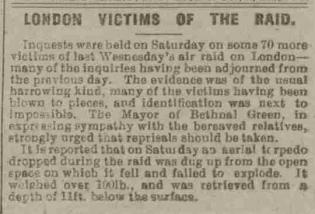
At home, on the 13th of June, London suffered an air raid. After successes using Zeppelin airships to launch attacks on Great Yarmouth, Kings Lynn, and London, the Germans switched their attention to the use of Gotha aeroplanes.
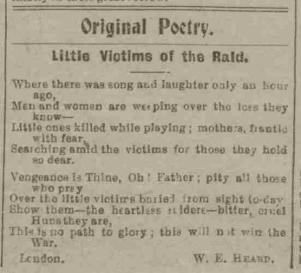 This next attack on the capital resulted in the deaths of 162 civilians, the highest death toll from a single air raid on Britain during WW1, and inspired the verse reproduced here in the North Devon Journal – the sentiment that bombing the innocent will not win wars resounds down the years but the lesson remains unlearned. A further attack, on 7th July, killed a further 57.
This next attack on the capital resulted in the deaths of 162 civilians, the highest death toll from a single air raid on Britain during WW1, and inspired the verse reproduced here in the North Devon Journal – the sentiment that bombing the innocent will not win wars resounds down the years but the lesson remains unlearned. A further attack, on 7th July, killed a further 57.
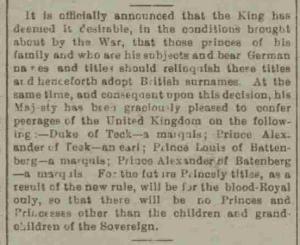 Meanwhile, the Royal Family had come to the decision to adopt more British sounding surnames, and at the same time, to restrict the titles of Prince and Princess to those in direct line to the throne. Existing princes and princesses were to be ennobled and so Prince Louis of Battenberg was to become a marquis, having been forced to resign as First Sea Lord, and being the father of Louis, later Earl Mountbatten.
Meanwhile, the Royal Family had come to the decision to adopt more British sounding surnames, and at the same time, to restrict the titles of Prince and Princess to those in direct line to the throne. Existing princes and princesses were to be ennobled and so Prince Louis of Battenberg was to become a marquis, having been forced to resign as First Sea Lord, and being the father of Louis, later Earl Mountbatten.
Back at home in North Devon the casualties from the War continued to rise, due to battle, injury or sickness, with casualties from the various fronts. The North Devon Journal of Thursday 7th June 1917 carried 26 death notices, half of which were directly related to the War.
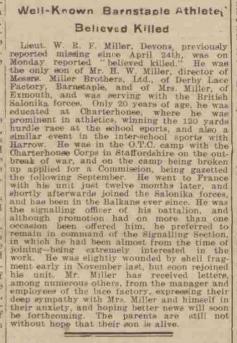 Among the death announcements in this week were those of George Henry Tucker of Northam, in Mesopotamia, and of Lieut William Reginald Francis Miller. Lieut Miller was the only son of William Miller, then living in Exmouth, who had followed his own father William Walter Miller as a director of the Derby Lace Factory. Lieut Miller had in fact died in action on the 25th of April that year and the Western Times reported that he was “believed killed” in May, noting that many employees of the lace factory had written to the parents to express their “deep sympathy … in their anxiety“.
Among the death announcements in this week were those of George Henry Tucker of Northam, in Mesopotamia, and of Lieut William Reginald Francis Miller. Lieut Miller was the only son of William Miller, then living in Exmouth, who had followed his own father William Walter Miller as a director of the Derby Lace Factory. Lieut Miller had in fact died in action on the 25th of April that year and the Western Times reported that he was “believed killed” in May, noting that many employees of the lace factory had written to the parents to express their “deep sympathy … in their anxiety“.
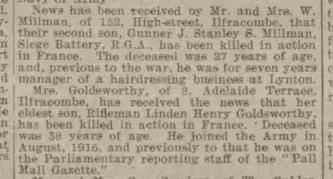 The deaths of Stanley Millman and Linden Goldsworthy of Ilfracombe were recorded in the Western Times. Both had been killed in action in France.
The deaths of Stanley Millman and Linden Goldsworthy of Ilfracombe were recorded in the Western Times. Both had been killed in action in France.
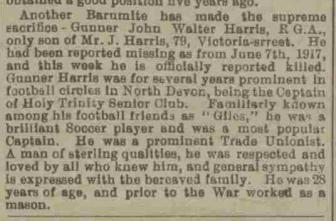 The death of John Walter Harris, who had been reported missing from the 7th of June, was not confirmed officially until the end of March 1918. What agonies his family must have gone through in the meantime can only be imagined. The memorial notice below was placed in the paper by his sisters in 1930.
The death of John Walter Harris, who had been reported missing from the 7th of June, was not confirmed officially until the end of March 1918. What agonies his family must have gone through in the meantime can only be imagined. The memorial notice below was placed in the paper by his sisters in 1930.
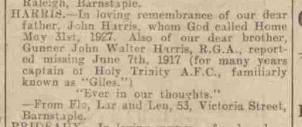
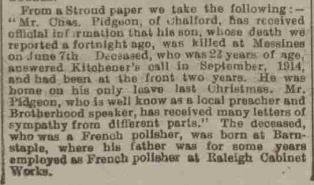
The only direct reference to a death due to the conflict at Messines comes in a report lifted from a Stroud newspaper concerning that of the son of a former Barnstaple resident, Charles Pidgeon, who had worked at Raleigh Cabinet Works (Shapland and Petter) as a French polisher, a profession into which his son had followed.
The names of Friend and Reed are still associated today with their respective villages of Shirwell and Braunton. Both families were to lose a son in the summer of 1917 and the accounts of the well attended memorial services reflect their standing in the community.
According to the 1901 Census, this particular Friend family had in fact only moved to Shirwell after the births of Thomas and Ernest, both mentioned in the article below published on Thomas’ death.
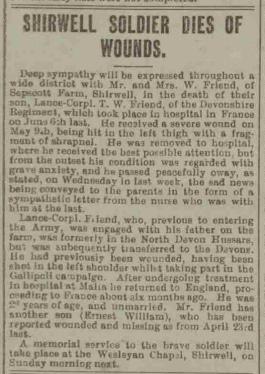
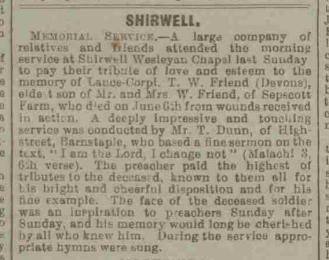


Earlier in the year their father William had attended a tribunal to oppose the conscription of his youngest son, John Marshall, who was a horseman on the family farm. His case was upheld.
Ernest is described as wounded and missing from April 23rd. He was later “presumed dead” and the entry below shows the allowances then paid to his father.

Ernest Reed of Braunton is shown here, in the 1922 Census, living at home in Church Street with his parents and younger sister. He was then working as a postman, as, according to his obituary notice six years later, he continued to do until enlisting two years previously.
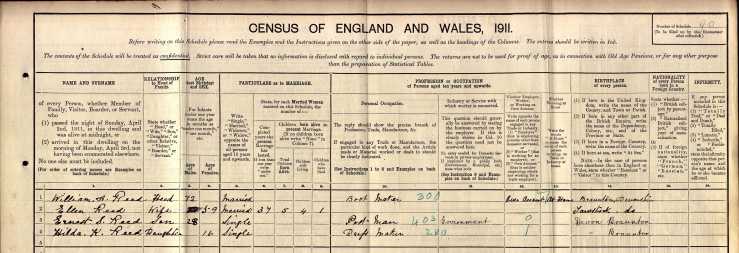
Later in the month the deaths of William A Jewell of Appledore and Walter Lewis of Barnstaple were confirmed, both from fever – the former in Basra from cerebro spinal fever, the latter from malarial fever in India.
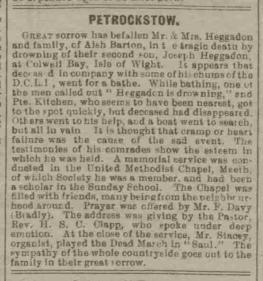
Sadly it was not just battle and illness which claimed the lives of the young enlisted men. This sad account describes how Joseph Heggadon of Petrockstowe drowned whilst bathing off the Isle of Wight with other members of the Duke of Cornwall’s Light Infantry. Perhaps he was not used to the effects of tidal currents, living further inland at some distance from the sea.
Sources –
Ancestry Library Edition – 1911 Census, UK, Army Registers of Soldiers’ Effects 1901-1929, Soldiers Who Died in the Great War – (free access available in the Local Studies Centre and any Devon library, subject to conditions)
British Newspaper Archive – North Devon Journal, Western Times – (online – available free in the Local Studies Centre, charge for printouts)
http://www.nationalarchives.gov.uk/pathways/firstworldwar/spotlights/airraids.htm





